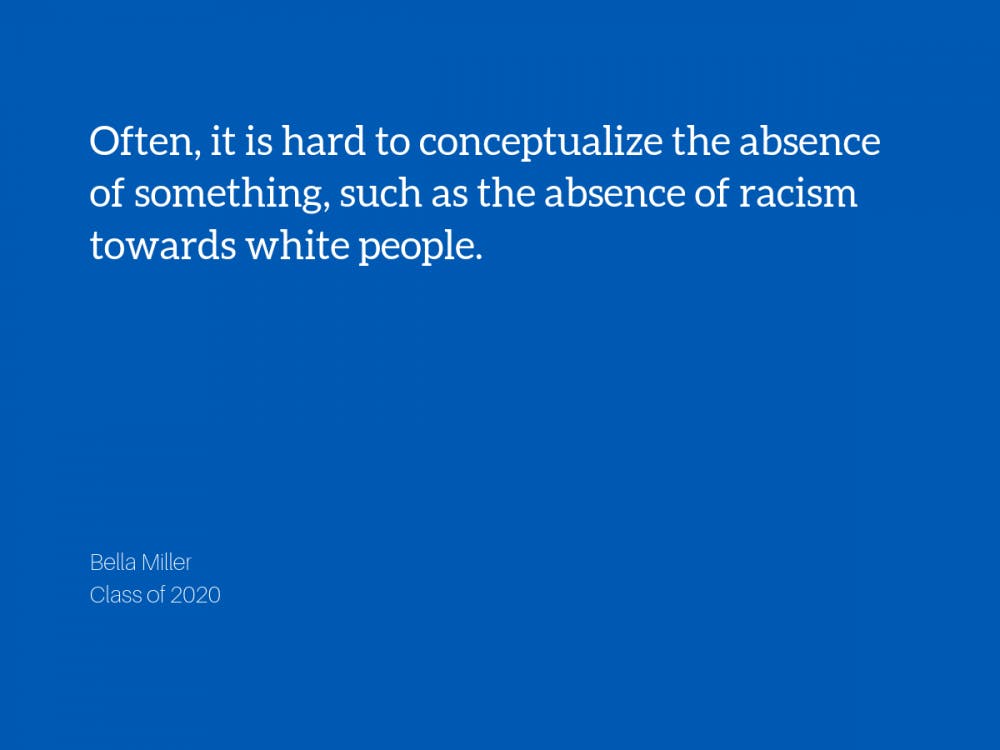I’m white. I’ve lived in my white body for 22 years. And it took me until recently to actually realize what that means. I grew up in the North Shore of Chicago, one of the whitest spaces in one of the country’s most segregated cities.
My public high school’s racial makeup was over 90 percent white and less than one percent black. Because everyone around me was white, whiteness seemed unremarkable. I understood being white as something like a blank slate, the status quo, the absence of race. Whiteness, to me, was invisible, making color a mark of otherness.
Nonetheless, I was not completely ignorant—I knew a bit about the racism that made my town the white space that it was. I knew that blackness was largely disallowed, especially in my area. However, I did not understand the critical role that my personal whiteness played in all this: that at the other end of the disallowance of blackness lies the affirmation of whiteness.
Coming to Duke, I was surrounded by much more diversity. Even so, my conceptualization of whiteness remained unshaken. Despite Duke’s relative diversity, it is an inherently white space, as prestigious universities tend to be.
Universities, aside from HBCUs (Historically Black Colleges and Universities), tend to be centers and reproducers of whiteness. At Duke, we see this in the majority white student body, the majority white faculty and professors, the majority white authors we read in class; at the heart of academia lies whiteness. Moreover, we also see the majority white faculty juxtaposed with the majority black staff. Within a white space, I fit right in and remained unaware of my whiteness.
While I considered myself an activist, I still did not fully understand how my whiteness played into the picture.Here’s an example: during my sophomore year, Duke NAACP (National Association for the Advancement of Colored People) had an opening for one of their executive positions. The role had similar requirements to that of my Duke Red Cross Executive Position, so I thought I’d be good for the role and I applied.
It was not until my interview that I realized my ignorance in applying. I was being interviewed by two black women and the woman who came in after me appeared to be a woman of color. These were people who understood what it is like to be a woman of color, people who should be leading the NAACP movement on Duke’s campus. Why, as a white woman, would I know what’s best for a group of people of color? Being a “woke,” educated white woman, studying issues of race in school and being an activist led me to believe that I understood—on some level—people of color’s experiences.
The reality is that I didn’t, and as a white person, I will never fully understand. Within a movement I cannot fully understand, I should listen and help where I can, not try to lead the movement. In this situation, I should have just been a part of the general body. Rather, the whiteness that constantly reminds me that I am intelligent and valuable—and even that I know what marginalized communities need—wrongly affirmed my applying for a role that I had no business applying for. It goes without saying that I did not get the position.
Moreover, a few weeks ago with my BassConnections team, I participated in an activity where a statement is read and we choose a corner of the room that represented one of the following answers: strongly agree, agree, disagree, strongly disagree. One of the statements presented was “Systemic racism affects me every day”. I moved to the strongly agree corner of the room and found myself in a group with over ten black people and one other white woman. When discussing why we chose this corner, the black people in the group’s answers almost went without saying. Like, duh. Heads turned to me to ask why I was there. How as a white person, does systemic racism affect my daily life? The reality is that systemic racism affects me positively every day. It has provided me the privilege that created a pathway to Duke. It affirms that I deserve to be where I am. It lets me live without fear of police and authority. It allows me to take up space. It affirms my opinions are valid even when they aren’t. It’s a catalyst for people to make positive assumptions about me. It is the reason that I never even have to think about my race.
Not having to think about my race as I move through spaces is one of the greatest privileges. Often, it is hard to conceptualize the absence of something, such as the absence of racism towards white people. This contributes to our low awareness, as white people, of the privileges that we carry in every space.
As a white person, the most critical thing you can do is be aware of our whiteness and the way that it affects our daily life as well as the lives of others. This means applying a racial lens to the world around you, because being color-blind means being ignorant to a world structured by racism. Lastly, I believe that our role as white people is largely to listen, not to take up more space than we already do. To listen to movements, to learn how to participate. To listen to people of color’s lived experiences. To stop talking and just listen.
Bella Miller is a Trinity senior. Her column, “make Duke weird,” runs on alternate Tuesdays.
Get The Chronicle straight to your inbox
Signup for our weekly newsletter. Cancel at any time.

